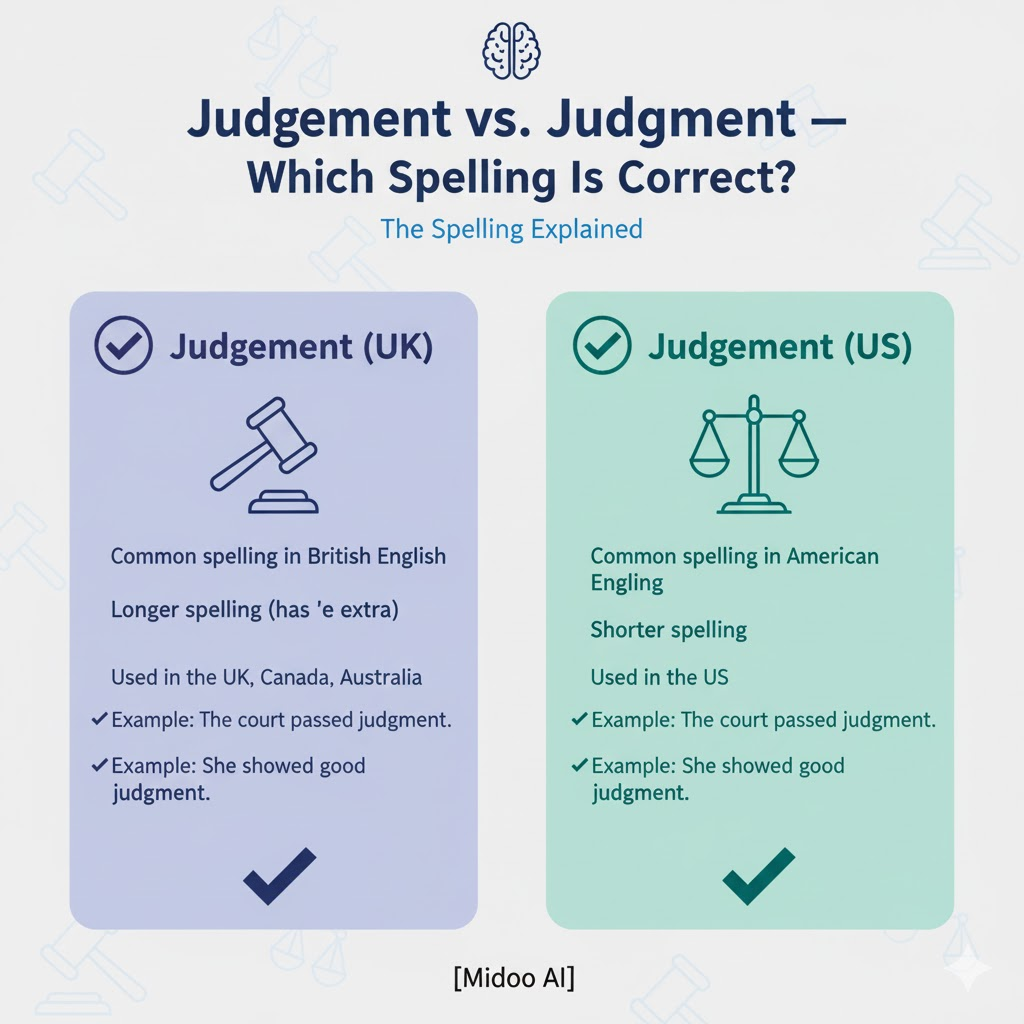Judgement vs. Judgment — Which Spelling Is Correct?

English spelling can sometimes be confusing — especially when two words look almost identical but are used differently across regions. One of the most common examples is “judgement” vs. “judgment.”
At Midoo AI, we often see English learners unsure which version is “right.” The truth is — both are correct, but which one you use depends on where you are and what context you’re writing in. Let’s break it down clearly so you’ll never hesitate again.
1. The Core Difference
- Judgment — Preferred spelling in American English and the most common in legal writing worldwide.
- Judgement — Accepted in British English, especially in general (non-legal) contexts.
In short, Americans almost always write judgment, while the British often use judgement, except in courts of law, where judgment is standard even in the U.K.
2. “Judgment” in American English
In the United States, judgment (without the “e”) is the only accepted spelling — whether it’s used in law, psychology, or everyday writing.
Examples (American English):
- The court issued a final judgment yesterday.
- Use your best judgment when making decisions.
- His poor judgment got him into trouble.
- I trust your judgment on this issue.
Tip: If you’re writing for a U.S. audience or for formal contexts like law or business, always use judgment.
3. “Judgement” in British English
In the U.K., both spellings appear — but there’s a subtle rule:
- Judgement is common in everyday writing.
- Judgment is preferred in legal documents and formal writing.
Examples (British English):
- That was a serious error of judgement.
- She showed excellent judgement under pressure.
- The High Court delivered its final judgment last week.
- His judgement was clouded by emotion.
Tip: In British English, you can use judgement in casual writing, but judgment is safer for professional contexts.
4. Quick Comparison Table
| Context | American English | British English |
|---|---|---|
| Legal writing | Judgment | Judgment |
| Everyday/general use | Judgment | Judgement |
| Formal/business writing | Judgment | Judgment (preferred) |
| Informal conversation | Judgment | Judgement |
5. Common Mistakes to Avoid
❌ The judge made a fair judgement. (in U.S. English)
✅ The judge made a fair judgment.
❌ Your judgment was clouded by emotion. (in informal U.K. note—it’s fine, but in formal U.K. use, choose “judgment”).
Tip: When in doubt, choose judgment — it’s correct everywhere, including British legal writing.
6. Why Two Spellings Exist
Both forms date back to the 14th century. The original Middle English word was jugement, from Old French.
- Over time, Noah Webster, the American lexicographer, simplified many spellings in his 1828 American Dictionary of the English Language, dropping the extra “e” — giving us judgment.
- British English kept the older French-influenced form judgement in many cases, though legal English also dropped the “e.”
So, today, the variation is mostly a matter of tradition and region, not grammar.
7. Easy Memory Tip
Think of it this way:
- JudgEment → has an extra “e” → “E” for England.
- Judgment → simpler form → used in the U.S. and formal/legal English worldwide.
8. Real-Life Usage
- The judgment of the court was unanimous. (U.S. and U.K. legal English)
- That was poor judgement on your part. (British casual English)
- She demonstrated great judgment in choosing her team. (American English)
- His judgement is often influenced by his emotions. (British English)
FAQ
Q1: Is “judgement” wrong?
No, it’s not wrong! It’s just less common in American English. British English allows both, depending on context.
Q2: Which one should I use in academic writing?
If your institution uses American English, choose judgment. If it follows British English, both are fine — but judgment is slightly more formal.
Q3: What about in legal documents?
Always use judgment, even in the U.K. Legal professionals universally prefer this spelling.
Q4: Do Canadians use “judgment” or “judgement”?
Canadian English tends to follow British spelling, but in law and government, judgment is standard.
Q5: Can I mix them in one document?
Avoid mixing. Choose one spelling and stay consistent throughout your writing.